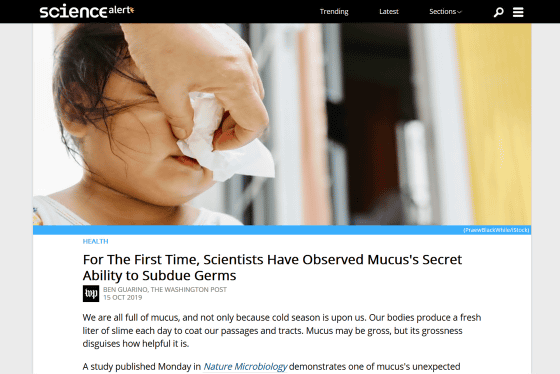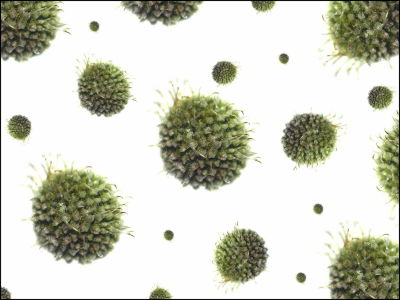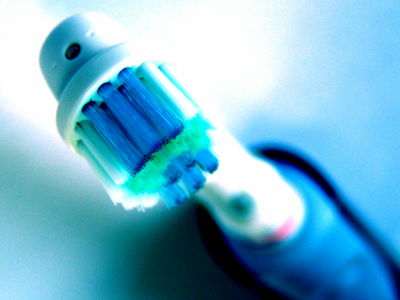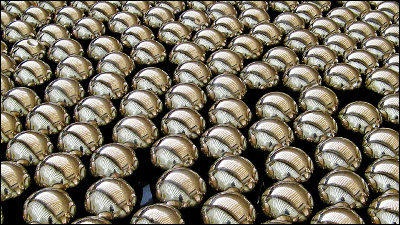It turned out that mucus such as runny nose has the function of `` tame microorganisms that can be harmful ''

by
Many people say that a runny nose appears in the cold season, but many parts of the human body, such as the mouth and digestive tract, are covered with slimy mucus regardless of the season. A research team investigating human mucus discovered that 'mucus has the ability to tame microorganisms that can be harmful.'
Mucin glycans attenuate the virulence of Pseudomonas aeruginosa in infection | Nature Microbiology
https://www.nature.com/articles/s41564-019-0581-8
Sugars in mucus stop microbes, study of snot and germs shows-The Washington Post
https://www.washingtonpost.com/science/2019/10/14/snot-contains-powerful-sugars-that-tame-germs/

Ribbeck's research team is investigating a mucous substance called mucin in mucus. Mucin is a mixture of glycoproteins containing a large amount of sugar, and plays a role in protecting cells and serving as a lubricant. According to Ribbeck, mucin is 'a substance that looks like a small brush.'
“It's almost never studied that occupies much of our body's surface,” Ribbeck said, pointing out that mucin research is not progressing. Prof. Gunnar Hansson of the University of Gothenburg, Sweden, who is not a member of the research team but who studies mucin, said, 'Mucous was once considered a 'bad thing' in the fields of public health and medicine.' The research is very complex and lags behind most other biomedical fields. '

by
In general, human body mucus is often described as 'playing the role of a filter that traps external microorganisms', but Ribbeck says, 'When we add microorganisms to mucus, mucus does not capture microorganisms at all. 'It was.' Rather, microorganisms seem to float freely in mucus, but for the immune system, it is easier to deal with floating in mucus than microorganisms aggregate and become difficult to penetrate.
However, it is not necessary for the human body to kill all the microorganisms contained in the mucus. Ribbeck points out that there are actually only a few microorganisms that have a negative impact on the human body, and that there are actually a large number of microorganisms both inside and outside the human body. Some microorganisms are beneficial to the human body. For example, some microorganisms that live in the mucus of the digestive tract can help digest food.
Ribbeck commented on the relationship between the human body and microorganisms: 'We provide a residence for microorganisms, and in return, microorganisms provide us with various services.' Based on this idea, Ribbeck thought that mucus might have a “function to tame microorganisms to friendly residents”.

by
Therefore, Ribbeck and his team conducted an experiment to confirm how the O-linked sugar chains that make up mucins react with microorganisms. In the experiment, healthy individuals do not get sick even if they are infected, but for those with reduced immunity, Pseudomonas aeruginosa causing the disease is embedded in mucus and cultured with burned pig skin or human epithelial cells. did.
As a result of experiments, it was found that the infectivity of Pseudomonas aeruginosa decreases due to the action of O-linked sugar chains. O-linked sugar chains blocked various genetic pathways including Pseudomonas aeruginosa attack on cells, secretion of toxins, communication between Pseudomonas aeruginosa, and formation of Pseudomonas aeruginosa clusters. Ribbeck commented on the function of the O-linked sugar chains that make up the mucin, 'It's like a fairy powder.'
In addition, research unpublished in this paper suggests that O-linked sugar chains can tame microorganisms such as Streptococcus mutans and yeast like Pseudomonas aeruginosa. In recent years, it is considered dangerous that microorganisms evolve into super bugs that resist antibiotics and kill antibiotics. Therefore, Ribbeck argued that instead of killing microorganisms, taking the approach of “weaking infectivity and domestication” could be an effective strategy for infectious diseases.

Related Posts:
in Science, Posted by log1h_ik







